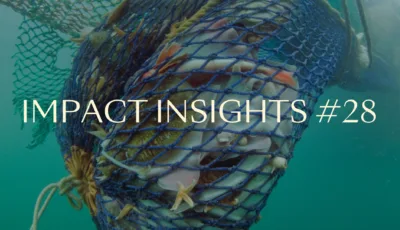Impact Insights #15

Discover the latest impact insights curated by Norselab's Impact Analyst, Inès van Tol.
■ Record high ocean temperatures cause dramatic episode of coral bleaching
Corals provide valuable ecosystems services valued at USD 9.9 trillion, as one billion people depend on them for coastal protection, tourism and the procurement of animal protein. However, ocean temperatures have been breaking records every single day for the past year, repeating the pattern witnessed last year. Atmospheric heat, increasing due to the accumulation of heat-trapping greenhouse gases, is largely absorbed by the ocean and causes its temperature to rise significantly. A seemingly small increase in ocean temperatures can have dramatic consequences such as heightened stress levels for corals, causing them to turn white and eventually die.
US National Oceanic and Atmospheric Administration (NOAA) recently confirmed that corals are suffering the fourth ever global coral bleaching event - the second in ten years - where coral bleaching has been reported in at least 54 countries in the span of a year. While more than 50% of coral reefs have already vanished since the 1950s, significantly reducing our GHG emissions now would still give a fighting chance for the remaining corals to recover.
■ The European Court of Human Rights finds Switzerland guilty in first-ever climate case
Strasbourg was the stage of an unprecedented climate victory this month. The Swiss government was found guilty of violating the human rights of elderly women by the European Court of Human Rights, due to its inadequate climate action and hence failure to protect citizens from the adverse effects of climate change. KlimaSeniorinnen, a group of 2000 women in their 70s experiencing trouble to breathe and heart issues during heatwaves, initiated action against their government back in 2023. This landmark case is likely to spark a ripple effect in climate litigation, whereby legal action against slow-acting governments will increase significantly. For instance, Scotland recently sparked frustration among campaign groups as the scrapping of its target to reduce greenhouse gas emissions by 75% by 2030 was announced, after missing eight out of twelve annual targets.
■ New Regulation on Ecodesign of Sustainable Products to end the ‘take, make, throw away’-model
On April 23rd, the European Parliament approved the Regulation on Ecodesign of Sustainable Products, which is now ready to enter into law in all EU member states and will amend the existing directive from 2009. To promote more responsible production and consumption, the regulation bans the destruction of unsold clothes and footwear and requires diligent reporting on quantities of other unsold products discarded, and the reasons for it. In addition, the regulation will enforce minimum requirements for ecodesign of products on European markets, to increase product lifetime, and facilitate reuse, repair, and recycling. Finally, the concept of a digital passport for products was introduced. This will allow consumers to make purchasing decisions based on reliable information relating to performance, traceability, and compliance.
■ In England, small development projects must now also achieve a 10% net gain in biodiversity
Back in February 2024, England launched a mandatory biodiversity credit scheme, the Biodiversity Net Gain (“BNG”). The scheme imposes an obligation to create a 10% net gain in biodiversity in development projects, and requires the use of a calculation tool that measures the biodiversity value of different habitats such as grassland, hedgerows, lakes, woodland, rivers and streams. The tool thus makes it possible to calculate the biodiversity value of a habitat, and to assess which mechanisms could increase that value: pathways for wildlife, green walls, Sustainable Drainage Systems, planting mixes, etc. This is a welcome development in times when more than 80% of European habitats are in poor shape, and measuring our actions’ impact on biodiversity is still considered complex. This should be followed closely in order to assess whether pledged habitat benefits actually come to life.
■ Nature research finds that EU’s agricultural subsidies mainly support emissions-intensive animal products
The European Union allocates close to a third of its budget on subsidies through the Common Agricultural Policy (“CAP”), among which 80% favour animal-based foods. This is four times more than subsidies to plant-based foods. This distorts the true cost of animal-based foods, and incentivizes their production and consumption although they only represent 35% of EU calories, while being responsible for more than 80% of the EU’s food GHG emissions. Those subsidies are a structural challenge in times when the consumption of animal produce needs to be drastically reduced. In order to support the goal to make Europe the first climate-neutral continent by 2050, the EU must incentivize more sustainable diets by shifting subsidies away from industrial animal farming to the production of plant-based foods, which brings more nutritional value for less land used. A representative pricing of animal-based products would need to take into account their substantial environmental and health impacts.


